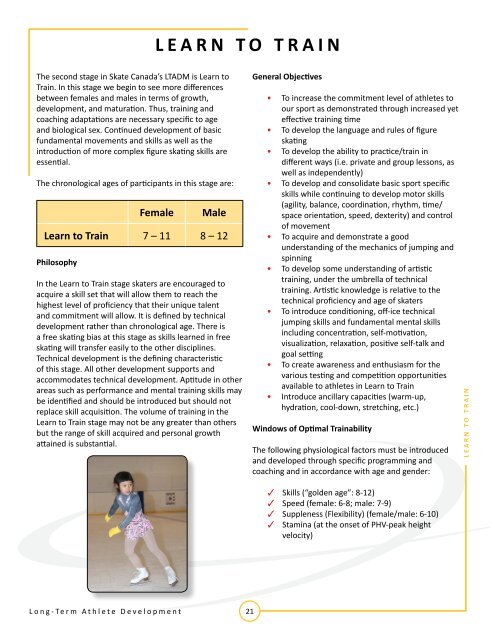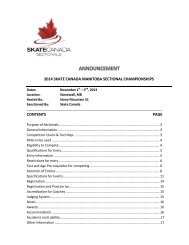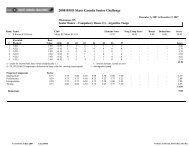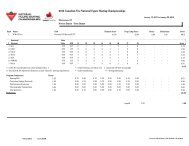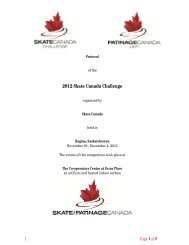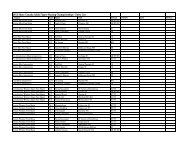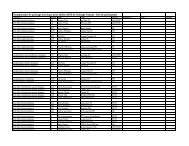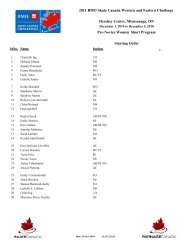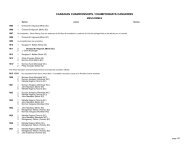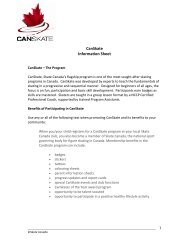LONG-TERM ATHLETE DEVELOPMENT - Skate Canada
LONG-TERM ATHLETE DEVELOPMENT - Skate Canada
LONG-TERM ATHLETE DEVELOPMENT - Skate Canada
Create successful ePaper yourself
Turn your PDF publications into a flip-book with our unique Google optimized e-Paper software.
The second stage in <strong>Skate</strong> <strong>Canada</strong>’s LTADM is Learn to<br />
Train. In this stage we begin to see more differences<br />
between females and males in terms of growth,<br />
development, and maturation. Thus, training and<br />
coaching adaptations are necessary specific to age<br />
and biological sex. Continued development of basic<br />
fundamental movements and skills as well as the<br />
introduction of more complex figure skating skills are<br />
essential.<br />
The chronological ages of participants in this stage are:<br />
L o n g - Te r m A t h l e t e D e v e l o p m e n t<br />
865 Sheord Road, Ottawa, Ontario K1J 1H9<br />
Phone 613.747.1007 I Toll Free 1.888.747.2372 I Fax 613.748.5718 I Toll Free Fax 1.877.211.2372<br />
Female Male<br />
Learn to Train 7 – 11 8 – 12<br />
Philosophy<br />
In the Learn to Train stage skaters are encouraged to<br />
acquire a skill set that will allow them to reach the<br />
highest level of proficiency that their unique talent<br />
and commitment will allow. It is defined by technical<br />
development rather than chronological age. There is<br />
a free skating bias at this stage as skills learned in free<br />
skating will transfer easily to the other disciplines.<br />
Technical development is the defining characteristic<br />
of this stage. All other development supports and<br />
accommodates technical development. Aptitude in other<br />
areas such as performance and mental training skills may<br />
be identified and should be introduced but should not<br />
replace skill acquisition. The volume of training in the<br />
Learn to Train stage may not be any greater than others<br />
but the range of skill acquired and personal growth<br />
attained is substantial.<br />
L E A R N T O T R A I N<br />
21<br />
General Objectives<br />
• To increase the commitment level of athletes to<br />
our sport as demonstrated through increased yet<br />
effective training time<br />
• To develop the language and rules of figure<br />
skating<br />
• To develop the ability to practice/train in<br />
different ways (i.e. private and group lessons, as<br />
well as independently)<br />
• To develop and consolidate basic sport specific<br />
skills while continuing to develop motor skills<br />
(agility, balance, coordination, rhythm, time/<br />
space orientation, speed, dexterity) and control<br />
of movement<br />
• To acquire and demonstrate a good<br />
understanding of the mechanics of jumping and<br />
spinning<br />
• To develop some understanding of artistic<br />
training, under the umbrella of technical<br />
training. Artistic knowledge is relative to the<br />
technical proficiency and age of skaters<br />
• To introduce conditioning, off-ice technical<br />
jumping skills and fundamental mental skills<br />
including concentration, self-motivation,<br />
visualization, relaxation, positive self-talk and<br />
goal setting<br />
• To create awareness and enthusiasm for the<br />
various testing and competition opportunities<br />
available to athletes in Learn to Train<br />
• Introduce ancillary capacities (warm-up,<br />
hydration, cool-down, stretching, etc.)<br />
Windows of Optimal Trainability<br />
The following physiological factors must be introduced<br />
and developed through specific programming and<br />
coaching and in accordance with age and gender:<br />
3 Skills (“golden age”: 8-12)<br />
3 Speed (female: 6-8; male: 7-9)<br />
3 Suppleness (Flexibility) (female/male: 6-10)<br />
3 Stamina (at the onset of PHV-peak height<br />
velocity)<br />
L E A R N T O T R A I N


